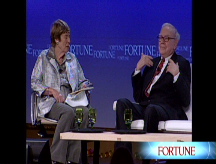How women are redefining power
The traditional male style doesn't appeal to many women, says an eminent executive coach, and that's okay. Women's own style works just fine, if they let it.
 |
| Sen. Clinton is changing how people see powerful women, says executive coach Lois Frankel. |
(Fortune) -- Not long ago, in a workshop with a group of senior executives, coach Lois Frankel tried a little experiment.
"You look like a pretty powerful person," she remarked, in a friendly tone, to one of the female honchos in the room. The woman reacted by demurring: "Who, me? No, no, I'm not really powerful..."
A few minutes later, Frankel made the same comment to a man in the group, whose executive rank was roughly the same as his female peer's. His response was radically different. He preened a little, acknowledged the compliment, and accepted it as his due.
"Women are often uncomfortable using the word 'power' in relation to themselves, and no wonder," says Frankel. "If we had to let men define power for us, we wouldn't want it." A Ph.D. in psychology, Frankel runs Pasadena, Calif.-based Corporate Coaching International, whose clients include Goldman Sachs (GS, Fortune 500), Procter & Gamble (PG, Fortune 500), Microsoft (MSFT, Fortune 500), and Disney (DIS, Fortune 500), and many others. Frankel is also the author of several bestsellers, including Nice Girls Don't Get the Corner Office (Business Plus, $19.95) and, most recently, See Jane Lead: 99 Ways for Women to Take Charge at Work (Warner Business Books, $22.95).
Earlier this year, Frankel and three female colleagues launched a blog called The Thin Pink Line that serves as a forum for executive women.
"The thin pink line women managers have to walk is that invisible but ironclad space between seeming 'too girly' or 'too bitchy' to be accepted as leaders," says Frankel. She'd like to see women widen that line by cultivating their natural abilities and creating their own leadership styles, and she thinks that is happening now. A few excerpts from our recent conversation:
Q. In See Jane Lead, you make the point that different leadership styles are effective in different eras - that, for example, George Patton and Norman Schwarzkopf's styles were completely different, yet each was well-suited to his times. Why do you believe that women are particularly well-qualified to lead now?
A. There are a couple of reasons. The traditional command-and-control management style, which came out of the military and is very "masculine," has become so outdated that the military doesn't even use it much anymore. To function well today, with the workforce we have now, organizations need leaders with great "people skills" or, to put it another way, high EQ [emotional intelligence]. And that is where women excel, in part - ironically - because women historically have lacked power, so we've had to wield influence by understanding what makes other people tick.
The emphasis now on relationships and teamwork, on bringing co-workers together to collaborate, plays directly into strengths that many women have cultivated all their lives in various settings. I also think that women's definition of power is much more about having control over their own lives than it is about trying to control other people, which fits well with a workforce that is getting steadily more diverse and more autonomous.
Q. Can you give us an example of how women are redefining power and creating their own leadership styles?
A. I think one good example has been this presidential election. Hillary Clinton and Sarah Palin are obviously quite different people, with radically different ideas and very dissimilar styles. But each in her own way is changing how people see powerful women.
People respect Clinton's intellect and Washington experience, although she has had to modify her style a little to keep from coming across as arrogant or elitist. Palin is more Everywoman's woman. Even if you disagree with her ideas, you might respect her street smarts, grit, and determination.
So having these two very visible, very different women in the national spotlight is, I think, broadening people's perceptions about what is possible for women. And women in leadership positions in business can choose to emulate whichever style works for them. As more women step up, the playing field gets bigger for everybody.
Q. You mention in See Jane Lead that there are some people, including some women, who just resist being led by a powerful woman, no matter how competent she is. How can female bosses overcome that resistance?
A. You know, almost every time I give a speech at a company, someone in the audience will ask, "Why do women in the workplace treat each other so badly?" I think part of it is a difference in expectations. We expect women to treat us better than men do - for example, to be more nurturing and more tolerant of work-life conflicts. Then, when a female boss treats us exactly the way a male boss would, there is resentment.
And women often don't cut each other any slack. But I think that, when women complain about female bosses, it's often because the boss seems to have turned her back on other women. It's worth noting that a big reason why Sarah Palin is so appealing to many female voters is a sense that "she's just like me."
If you're a powerful woman and you're meeting with resistance from the women under you, try mentoring those women. Let them see that you have not, in fact, gotten so high and mighty that their concerns don't interest you. Take them out to lunch once in a while. Then, if anyone gripes that you're "favoring" the women who work for you, ignore it. You're the boss. Do what your people need.
Q. See Jane Lead spells out 99 specific, down-to-earth things that women can do to get ahead at work. If you were to give just one piece of advice to ambitious women, what would it be?
A. Women often ask me, "How do I know what I should be doing?" I always say, look closely at the most successful women in your company, the ones who have attained the level you'd like to reach, and who are respected and admired. Even if they're not mentoring you, or even if they don't know you from Eve, watch them as carefully as you can. They're probably doing all the right things - thinking strategically, taking risks, coaching others, and so on. You can, too. ![]()
-
 The retail giant tops the Fortune 500 for the second year in a row. Who else made the list? More
The retail giant tops the Fortune 500 for the second year in a row. Who else made the list? More -
 This group of companies is all about social networking to connect with their customers. More
This group of companies is all about social networking to connect with their customers. More -
 The fight over the cholesterol medication is keeping a generic version from hitting the market. More
The fight over the cholesterol medication is keeping a generic version from hitting the market. More -
 Bin Laden may be dead, but the terrorist group he led doesn't need his money. More
Bin Laden may be dead, but the terrorist group he led doesn't need his money. More -
 U.S. real estate might be a mess, but in other parts of the world, home prices are jumping. More
U.S. real estate might be a mess, but in other parts of the world, home prices are jumping. More -
 Libya's output is a fraction of global production, but it's crucial to the nation's economy. More
Libya's output is a fraction of global production, but it's crucial to the nation's economy. More -
 Once rates start to rise, things could get ugly fast for our neighbors to the north. More
Once rates start to rise, things could get ugly fast for our neighbors to the north. More










